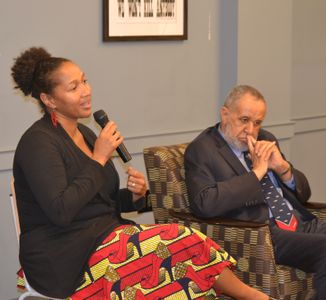Rev. Gilbert H. Caldwell Leads Dialogue on Civil Rights at STH
 During Boston University’s Alumni Weekend, the Rev. Gilbert H. Caldwell joined Boston University School of Theology (STH) to lead alumni/ae, faculty, students and staff in a discussion of civil rights and racial inequality.
During Boston University’s Alumni Weekend, the Rev. Gilbert H. Caldwell joined Boston University School of Theology (STH) to lead alumni/ae, faculty, students and staff in a discussion of civil rights and racial inequality.
Rev. Caldwell, who earned his Master of Divinity from STH in 1958, is a retired member of the Rocky Mountain Annual Conference of the United Methodist Church, co-founder of Black Methodists for Church Renewal, and co-founder of United Methodists of Color for a Fully Inclusive Church. Described as a “foot soldier” in the civil rights movement, Rev. Caldwell marched with Rev. Dr. Martin Luther King, Jr. and has also advocated for the full inclusion of LGBTQ people in the United Methodist Church.
Following a September 24 screening of the Oscar-award winning film Selma, Rev. Caldwell invited STH student Mariama White-Hammond to join him in leading the dialogue and in welcoming the audience to comment and pose questions about race, theology, and cultural diversity
The audience discussed racial diversity at Boston University, the part that race has to play in the theology and work of the church, and the Black Lives Matter movement. They dialogued about the role—and the limits—that education can play in overcoming racial inequities and the importance of an elementary and high school education that honestly teaches the travesties of American history. “Education is a two-edged sword,” said Mariama White-Hammond. “We need to be looking really closely and really carefully at what is being taught in our schools.”
Rev. Caldwell encouraged American citizens to look at the contradictions of America’s history, to grapple with the theological interpretations that led to racist beliefs, and to look at the relationship between racial inequality and the slave labor that helped to build America. He encouraged the audience to consider, “How have we become what we’ve become?”
Mary Elizabeth Moore, dean of Boston University School of Theology, described the dialogue as a “self-examination, a communal examination,” and only the beginning of many such dialogues to come.
